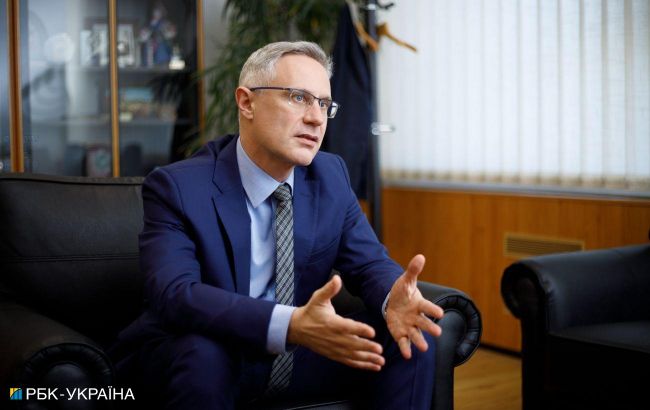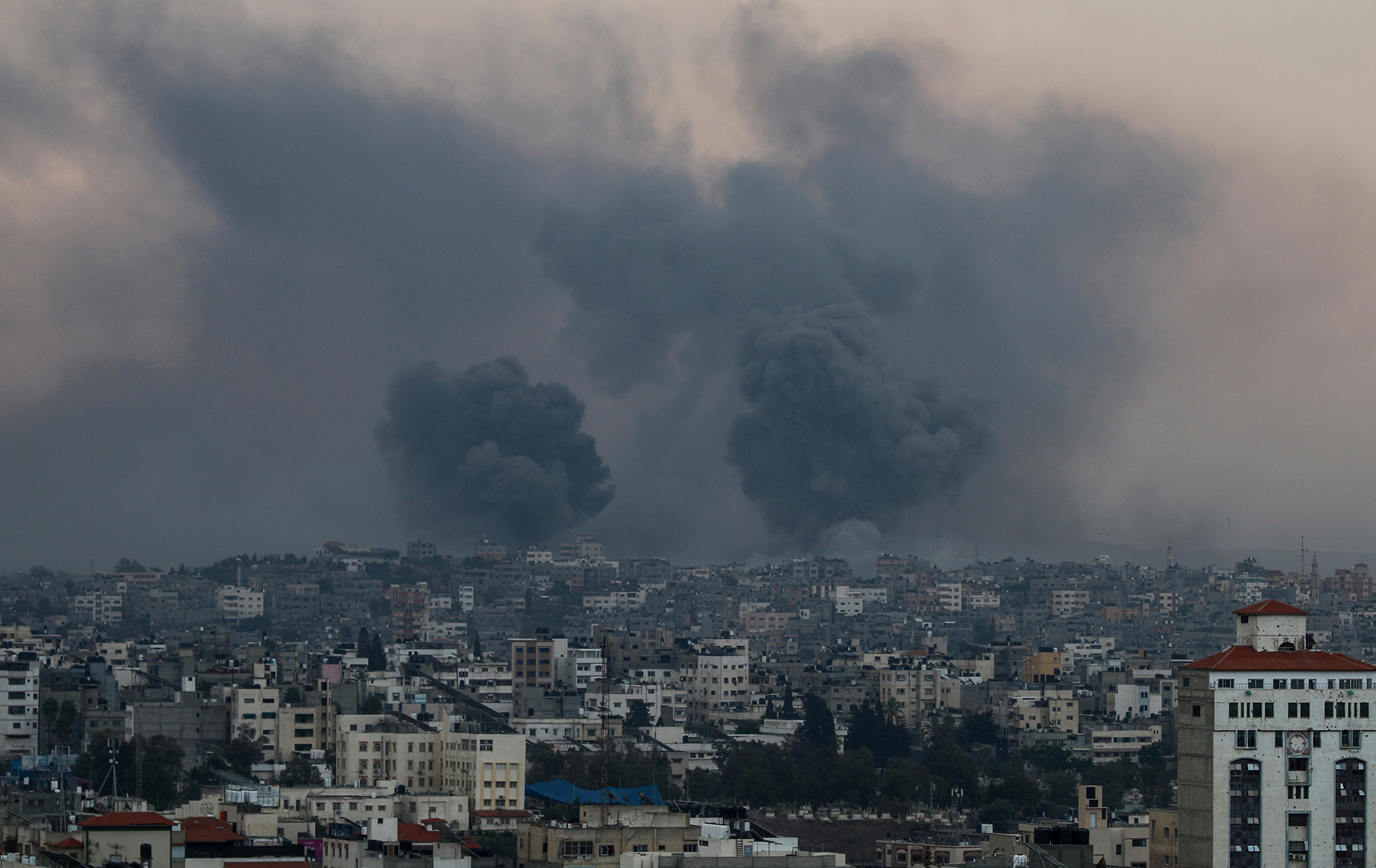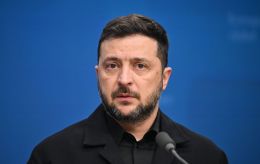Israeli Ambassador Michael Brodsky: Current situation is a continuation of the war for independence
 Ambassador of Israel to Ukraine Michael Brodsky (Photo: Vitalii Nosach / RBC-Ukraine)
Ambassador of Israel to Ukraine Michael Brodsky (Photo: Vitalii Nosach / RBC-Ukraine)
Ambassador of Israel to Ukraine Michael Brodsky discussed the current situation in Israel, parallels with the September 11 attacks, support from Ukraine, and the further developments in the Middle East in an interview with RBC-Ukraine.
The terrorist attack by Hamas against Israel, which began on October 7, has been unprecedented in scale for the past decades. At present, nearly all the militants who infiltrated Israeli territory have been neutralized.
However, it is evident that the scale of the conflict will continue to escalate. Within the framework of Operation "Iron Swords," the Israeli army is actively conducting airstrikes against terrorist targets in the Gaza Strip, with the possibility of a ground campaign. Additionally, the opening of a second front in northern Israel cannot be ruled out, especially if the Hezbollah group based in the border areas of Lebanon decides to engage in offensive actions.
In an interview with RBC-Ukraine, Israeli Ambassador in Kyiv, Michael Brodsky, acknowledges that the current events have already caused trauma to Israelis, comparable to the Yom Kippur War, the last major Arab-Israeli conflict that occurred exactly half a century ago in October 1973. He emphasizes that the primary focus at the moment is to eliminate the immediate threat to Israel and dismantle the infrastructure of terrorists in the Gaza Strip. "As long as the immediate threat to the lives of Israelis is not eliminated, everyone without exception will support the actions of the army and other security-related structures," says Brodsky.
– What is the current situation and the mood in Israel right now?
– Israel is experiencing an unprecedented attack on its territory. As of now, over 700 casualties have been reported, and several thousand people have been injured. Horrifying images and videos show that we are dealing with terrorists who have lost any semblance of humanity and have no moral restraints. Israel must take this into account when conducting military operations.
What is happening now: virtually all terrorists who infiltrated Israeli territory have been eliminated, and the next phase of the operation, which was announced, involves the destruction of the terrorist infrastructure in the Gaza Strip. Currently, there are ongoing airstrikes on terrorist infrastructure in Gaza, but a ground operation cannot be ruled out in the future.
– Is one of the possible scenarios that the Israeli army will eventually take control of the Gaza Strip?
– I cannot rule it out. I do not know the specific course of action that will be chosen by the Israeli army command, but it cannot be ruled out.
– Has Israel moved beyond the initial shock and taken the initiative?
– You are correct regarding taking the initiative, but in terms of shock – of course, Israel is still in shock because losing such a significant number of military and civilian lives for such a small country is a colossal shock and tragedy. I believe that Israel will have to heal its wounds for a long time. It is also important to note that Hamas likely holds over a hundred hostages, which significantly complicates the situation. Especially considering how sensitive this issue is in Israel, and among the hostages, there are women and children. It is a massive trauma for Israel, which can be compared to the trauma of the Yom Kippur War.
Another comparison that I have often seen and which probably has merit is the comparison to September 11 when a horrific terrorist attack was carried out against the United States. Something similar is being felt in Israel.
– So, this is the "Israeli September 11"?
– One could say that.
– Clearly, there were some mistakes, miscalculations, or negligence on the part of Israeli intelligence and the military. Is it safe to say that the "post-mortem analysis" and appropriate personnel decisions are postponed for now?
– I think that all conclusions will be drawn later. Discussions are ongoing in Israel, and the public is asking questions, which is normal. But all conclusions about how this happened and what exactly happened will be made later. Today, all efforts are focused on protecting Israelis and destroying the terrorist infrastructure in the Gaza Strip. The thoughts of Israelis are solely on this matter. Of course, there will be an investigation into what happened and a "post-mortem analysis," and I am confident that conclusions will be made.
 – In Israel, there has been a complex domestic political situation recently, with tensions. However, in recent days, there have been calls from leaders of different parties to form a national unity government in response to the situation. Why is it needed, and will it be formed?
– In Israel, there has been a complex domestic political situation recently, with tensions. However, in recent days, there have been calls from leaders of different parties to form a national unity government in response to the situation. Why is it needed, and will it be formed?
– For Israel, this is a common situation: society and politicians always come together in moments of threat, moments of war, and opposition supports the government in defending the state. I don't know whether a national unity government will be formed as a result, but I can say for sure that as long as there are ongoing military operations and an immediate threat to the lives of Israelis, everyone without exception will support the actions of the military and other security-related structures.
– How is the international support for Israel assessed in Israel after the start of these events? Have Israelis noticed, in particular, that Ukrainians immediately expressed their support?
– Most countries in the world have supported Israel, recognizing Israel's right to defend its territory, population, and self-defense. I am pleased that Ukraine is among those countries. We feel support at all levels from Ukraine, appreciate this support, and value the solidarity with Israel shown by the Ukrainian government, including the President, who spoke with our Prime Minister, as well as the government, parliament, mayors of many cities, and ordinary Ukrainians who support Israel.
Yesterday in Kyiv and other cities, the Israeli flag was displayed on electronic billboards. This is very important for us, and in Israel, we are aware of it. We understand that Ukraine feels a shared destiny with Israel, just as Israelis felt and supported Ukraine when the war began here over a year and a half ago.
– Your colleague, the German Ambassador to Ukraine Martin Jaeger, wrote on Twitter: "This is the same war that is being fought here in Ukraine. Freedom needs to be defended against all terrorist evil." To what extent do you agree with the idea that it is one and the same war, overall and in general?
– Many things today are interconnected, and it cannot be said that the situation in Ukraine today does not affect the Middle East, and vice versa. But I cannot say that it is the same war. Israel has been at war for its existence for decades. For 75 years, since the establishment of the State of Israel, we have been defending our independence against Arab states and later against terrorists.
What happened three days ago is an extension of the war against Israel, which today is backed by Iran, supporting terrorism not only in the Middle East but also in various countries. Iran has never concealed its desire to destroy Israel. So, first and foremost, for us, it is an extension of the war for the independence and existence of Israel in the Middle East.
– After what has happened since Saturday, the Middle East region will never be the same as it has been seen for the past few decades. Will everything change?
I think it is possible to assume that. Our region will change as a result of what has happened, and Israel is determined to destroy Hamas's infrastructure in the Gaza Strip and prevent anything like this from happening again.

